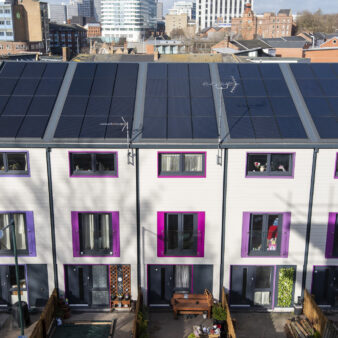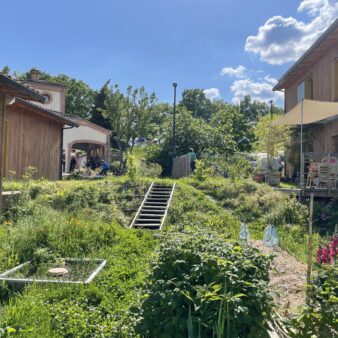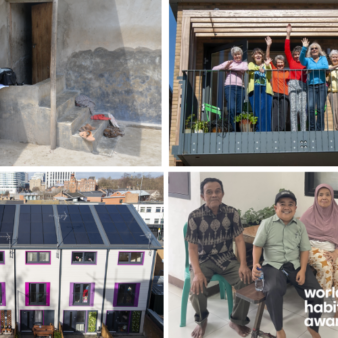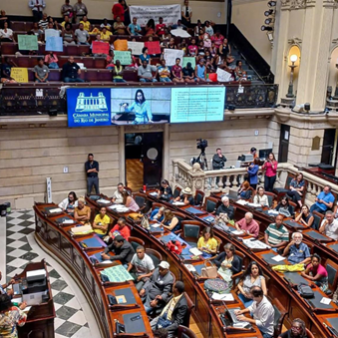1. Knowing our carbon footprint
World Habitat first calculated its carbon emissions in 2015 and again in 2016, with 2016 being used as the baseline year for a net-zero target by 2030. Our Board of Trustees have approved more ambitious targets to reduce our carbon emissions to net-zero by 2030 (instead of a 50% reduction by 2030 and net-zero by 2050 as originally proposed).
Our 2016 carbon footprint was calculated to be 121 tonnes of carbon dioxide equivalent (tCO2e) with air travel constituting almost 60% of our total emissions. We used the DEFRA carbon emissions calculator to measure our footprint, which includes Scope 2 and 3 emissions from:
- staff commuting to work;
- business travel (air, rail, bus, ferry, taxi);
- mileage claimed by staff, trustees and suppliers/partners;
- homeworking
- electricity used;
- water used; and
- waste disposal.
Each year since then we have been measuring our footprint and communicating these results to our staff and trustees, and publishing them in our annual report.
We will be reducing our annual emissions by 8.64 tonnes or 7% each year in order to achieve net-zero by 2030.
2. Reducing our emissions
We have developed a carbon management plan and taken steps to reduce our emissions. These include:
- improving the energy efficiency of property owned by World Habitat in Coalville e.g. changing all lighting to LED and installing loft and cavity wall insulation;
- switching to a renewable energy provider;
- setting an annual organisational emission reduction target, and an annual carbon budget for each programme; and
- regularly communicating on our carbon spending to staff and trustees.
- implementing a sustainable travel policy
- training our employees in carbon literacy
- implementing an electric car salary sacrifice scheme for all employees
Our immediate response to the COVID-19 pandemic – which included remote working and greater use of online communications has reduced related emissions significantly. In 2021, our carbon emissions were 15.07 tonnes.
In 2022 we returned to the workplace, moving to our new offices in Leicester. The offices are smaller than our previous offices, meaning our emissions from electricity, water and waste is reduced. We now operate a hybrid approach to working, where employees work from home part of the week. This reduces commuting and office related emissions.
We have proactively adjusted our approaches and policies so that we can continue to have a growing impact as an organisation, whilst reducing our carbon emissions. This includes holding events online and using local consultants for evaluation visits, further reducing emissions from travelling.
In 2022, our carbon emissions were 33.95 tonnes.
We continue to monitor our carbon emissions on a daily basis and a breakdown of our emissions for Q1 2023 can be found here.
3. Offsetting our unavoidable carbon emissions
Since 2017 we have offset our unavoidable carbon emissions with the Nubian Vault Association (AVN)’s unaccredited ACACIAS Project. AVN is a former World Habitat Award winner. The (AVN)’s Nubian Vault (NV) construction market is nowestablished and developing in the Sahel – Burkina Faso, Mali, Senegal, Benin and Ghana. The ACACIAS project aims to accelerate the development of this market by facilitating access to NV bioclimatic housing for Sahelian families living on less than 2$ a day, thus improving their living conditions. From 2022, we offset our carbon emissions of 34 tonnes with AVN and also with an accredited Gold Standard scheme, Kenya Biogas Programme. Click here to view our certificate.
This ensures we are supporting a housing based organisation and also offsetting our emissions using an accredited scheme. We are committed to doing this moving forward.
4. Aligning our investments with our organisational values
We recognise that as a charity we have an influential role to play in shaping a sustainable financial system. We want to make sure that our investments are in harmony with our mission and values.
We approved a new ethical policy as part of our investment policy in 2020. This highlighted how our investments must support our values and not have a detrimental impact on the people we are trying to help. The ethical policy ensures our investments are free from arms sales to military regimes, unethical lending practices, human rights violations, environmental degradation and activities – such as fossil fuel extraction – that are incompatible with the 2015 Paris Agreement to limit the increase in global average temperature to 2°C and pursue efforts to limit the increase to 1.5°C.
We commissioned an investment consultancy firm to carry out a review of our current investment funds during 2020 to see if they met our ethical policy. As a result of this work the trustees agreed to a full review of our investments in 2021, providing a handful of investment firms with our selected criteria for the new funds, and asked them to present a fund that meets the requirements of our ethical policy. This including paying a total return of 4% per annum.
Following this review, our Board of Trustees agreed to move our investments to the Cazenove Responsible Multi-Asset Fund and the Sarasin Climate Active Endowments Fund. This was completed in January 2022.
In addition, we also invest in housing-related programmes that reduce carbon emissions and also help provide safe and secure housing for low-income people.
5. Sharing our learning and working together with other organisations
We believe it is important to share our learning, processes and work with others to bring about positive impact on the climate crisis. We are a signatory to ACF Funder Commitment on Climate Change, which consists of six commitments or goals that World Habitat and other signatories pledge to work towards to play our part in tackling the causes and impacts of the climate emergency. By publicly expressing our commitment, the Funder Commitment makes us accountable – not least to making sure we stay fully committed to what we are working towards, including reporting back. It also enables us to exchange with a community of people working on similar issues and connects us to a growing #PhilanthropyForClimate global movement, which brings together various national and international philanthropy climate commitments
We have also achieved PlanetMark certification for a third consecutive year, which recognises our commitment to reduce our carbon footprint by at least 5% per year. PlanetMark, an internationally recognised sustainability certification for every type of organisation, also fosters a connection to other holders of the PlanetMark resulting in shared learning and the ability to develop collaboration opportunities.
To find out more about our recent COP26 Event Monday 8th November 2021 click here




